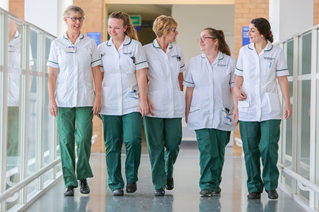Occupational Therapy case study
What does an Occupational Therapist do?
Occupational therapists make a real difference to patients’ lives by helping them to learn or regain the skills needed to perform tasks required to live and work. An occupational therapist will work with patients to assess their abilities, as well as their home and work environments, and produce a plan to guide people towards their goals and help them feel positive about their futures. They can suggest and provide adaptive equipment such as hoists and toileting aids to improve quality of life for patients with physical disabilities, and mental health patients too can be helped to regain confidence in areas such as time management, unfamiliar environments and public interactions through the assistance of an occupational therapist.
Hear from Jenny, a community Occupational Therapist at Norfolk Community Health & Care
Brief description of my role:
I visit patients in their own homes’ and care homes to try and reduce the risk of admissions, maintain their abilities and address complex manual handling challenges. I work in a great team of OTs, physios and highly skilled assistant practitioners. In our area we work especially closely with our community nursing colleagues. We complement and support each other, often in end of life situations which is a real privilege . We really do try and offer a joined up and multi-disciplinary approach. Patients and families seem to really appreciate that. More recently as OTs we have taken on more complex and longer term work which I have surprised myself by enjoying! For example I have arranged for permanent tracking hoists, specialist seating, level access showers and access. At the same time we are involved in some Safeguarding situations which requires close working with social care.

Happy healthy people providing excellent compassionate care
Where/how long I trained: I trained at Christ Church College, Canterbury 1998
Career progression so far: I loved my rotation at West Suffolk Hospital and gained a great range of experience including psychiatry. I was able to complete a secondment in a traumatic brain injury service before taking promotion at James Paget Hospital. An acute hospital provided so many opportunities for growth and experience but I didn’t feel the fit was quite right. I then moved to community work, initially in Rapid Response (admission prevention) but have absolutely loved working on the patch as a community OT for around 10 years now. It’s never dull and I feel like I’m constantly learning, doing new things and hopefully really making a difference to peoples’ lives.

